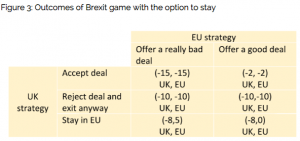How People are Predicting Brexit with Game Theory
http://press-files.anu.edu.au/downloads/press/n2328/pdf/ch01.pdf
http://www.politics.co.uk/comment-analysis/2017/03/15/the-game-theory-of-brexit
http://theconversation.com/game-theory-experts-credibility-is-key-for-a-successful-no-deal-brexit-strategy-85919
Originally I had planned to talk about how economists and analysts were able to synthesize information and simplify it into game theory matrices to determine the best possible outcomes for both sides or if there would be some sort of middle ground that would minimize the political economic impact on Britain and the European Union. After browsing a few sources, I decided to instead talk about the variability yet general consensus that game theory can provide for any situation.
I used Brexit as an example because of the multifaceted negotiations and options that the UK and EU could decide (without the other necessarily knowing before they themselves act) trying to maximize the yield (or more accurately minimize loss) coming out of this ordeal. Sound familiar? This negotiation is a situation where game theory can model the likely outcome and distill a mass of information into an easier to process format.
Many sources point to Great Britain on the losing side of Brexit: unable to leave the EU, losing free trade with many markets, and/or maintaining free movement on their borders. (GB wanted to restrict their borders to have better control of immigration, so maintaining the EU’s policy of free movement between any EU nation is undesired by GB; despite it hindering economic and political activity because of the increased regulations and potential fees for traveling to and within the EU as a non-member citizen.) This is all in addition to the same sources saying that GB has significantly less bargaining power than the rest of the EU because they have little to offer and much to lose economically.
The game theory matrices from Politics.co.uk and the Australian National University take into consideration from the bargaining power each group has, and the outlook for the UK is quite bleak. The second matrix shows how much Britain would actually gain if they got what they are demanding; and in this situation, the outlook is mostly negative for them and for Brussels. While the first matrix analyzes the scenarios of offers the EU would put on the table and the UK’s response, all of which would lead to highly unfavorable situations for the UK (and likely the EU as well).
I personally find these charts interesting and amusing because of how specific they are able to be to model specific aspects of Brexit and any other situation for that matter of fact. And the beauty of this is that they help people reach a collective conclusion. Like here, even though they were two different groups looking at different aspects of one event, both reached a similar conclusion that the UK was in a disfavorable bargaining position and would only suffer through this process. This is an example of how the use of game theory can illustrate a clear, concise conclusion able to be used by lawmakers and understood by all.


